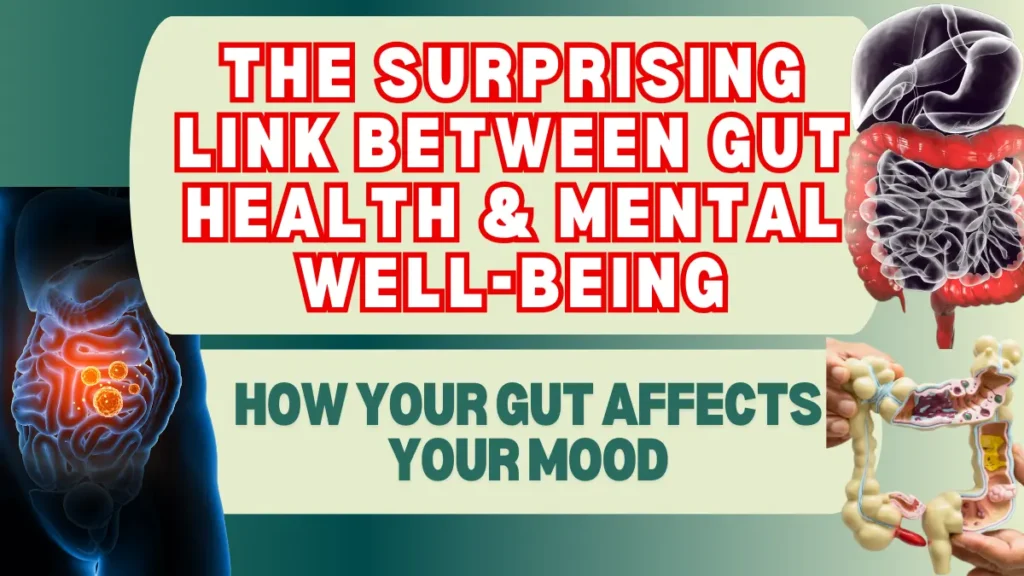Gut Health & Mental Well-being
Have you ever had a “gut feeling” about something? Or felt butterflies in your stomach when nervous? These common phrases hint at a deeper truth—your gut and brain are in constant communication. Emerging research reveals that the state of your gut health can significantly influence your mental well-being, affecting everything from mood to stress levels and even conditions like anxiety and depression.
In this article, we’ll explore the fascinating gut-brain connection, how an imbalanced gut can impact mental health, and practical tips to nurture both your digestive system and your mind.

Understanding the Gut-Brain Connection
Your gut and brain are linked through the gut-brain axis, a complex communication network involving nerves, hormones, and gut bacteria. The vagus nerve, one of the longest nerves in the body, acts like a superhighway, sending signals between your gut and brain.
But here’s where it gets interesting: your gut is home to trillions of bacteria, collectively known as the gut microbiome. These microbes don’t just help with digestion—they also produce neurotransmitters like serotonin (the “happy hormone”) and GABA (which helps regulate anxiety). In fact, about 90% of serotonin is produced in the gut, not the brain!
When your gut microbiome is out of balance (a condition called dysbiosis), it can lead to inflammation, poor nutrient absorption, and even mood disorders.
How Poor Gut Health Affects Mental Well-being
An unhealthy gut can contribute to:
- Anxiety & Depression – Imbalances in gut bacteria have been linked to higher levels of stress hormones like cortisol.
- Brain Fog & Poor Focus – Inflammation from a leaky gut can impair cognitive function.
- Mood Swings – Low levels of beneficial bacteria may reduce serotonin production.
- Chronic Fatigue – Poor gut health can lead to nutrient deficiencies, affecting energy levels.
Studies have shown that people with irritable bowel syndrome (IBS), Crohn’s disease, or other gut disorders often experience higher rates of anxiety and depression, further proving this connection.
Tips to Improve Gut Health for Better Mental Well-being
Want to boost your mood by healing your gut? Here are some science-backed strategies:
Video Credits
1. Eat a Gut-Friendly Diet
- Probiotic-rich foods (yogurt, kefir, sauerkraut, kimchi) introduce good bacteria.
- Prebiotic foods (garlic, onions, bananas, asparagus) feed the beneficial microbes.
- Fiber-rich foods (whole grains, legumes, vegetables) support digestion.
- Omega-3 fatty acids (salmon, flaxseeds, walnuts) reduce gut inflammation.
2. Reduce Sugar & Processed Foods
Excess sugar feeds harmful bacteria and yeast, leading to gut imbalances.
3. Manage Stress
Chronic stress disrupts gut bacteria. Try meditation, deep breathing, or yoga to calm your nervous system.
4. Stay Hydrated
Water helps maintain the gut lining and supports digestion.
5. Get Enough Sleep
Poor sleep harms gut bacteria, while a healthy microbiome promotes better rest.
6. Exercise Regularly
Physical activity increases microbial diversity, improving gut and brain health.
7. Consider Probiotic Supplements
If you struggle with digestive issues, a high-quality probiotic may help restore balance.
Final Thoughts: A Healthy Gut = A Happier Mind
The gut-brain connection is a powerful reminder that mental health isn’t just in your head—it’s in your gut, too. By nourishing your microbiome with the right foods, reducing stress, and adopting healthy habits, you can support both your digestion and emotional well-being.
If you’ve been struggling with mood swings, anxiety, or low energy, it might be time to look at your gut health. Small changes today can lead to big improvements in how you feel tomorrow.
What’s one gut-friendly habit you’ll start this week? Share in the comments below!











